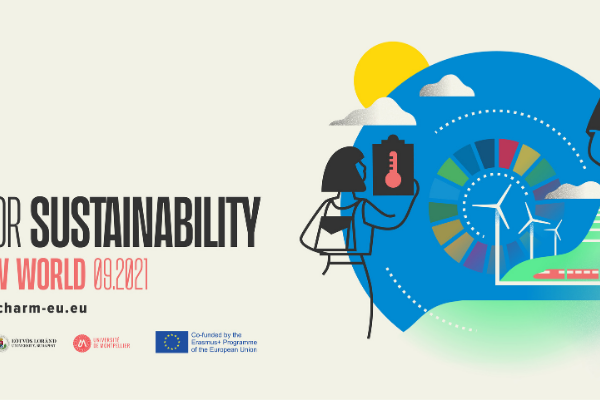The CHARM-EU Master in Global Challenges for Sustainability is a new international, innovative, flexible, inclusive programme with a challenge-driven, research-based curriculum. International student mobility is at the core of the programme. The programme will start in September 2021, deadline for applications is 15 April 2021.

Global Challenges for Sustainability
Students on the Master’s in Global Challenges for Sustainability will take 3 compulsory phases. The Preparatory Phase module will be featuring general capacities related to sustainability, social innovation and transdisciplinary research. The second part of the master’s degree will be flexible, allowing students to choose on one of three sustainability themes: Water, Food or Life & Health. Finally, students will be required to do a capstone project on a sustainability challenge in collaboration with extra academic actors (i.e. business, community and society).
Check out our interactive brochure here!
The programme is unique and innovative in various aspects, including the flexible three phased course structure, integrated mobility experiences, broader content focus, overall transdisciplinary approach and challenge-based environment.
This is a unique opportunity to obtain an accredited master’s degree jointly awarded by the five CHARM-EU partners’ universities: University of Barcelona, Trinity College Dublin, Utrecht University, Eötvös Loránd University and University of Montpellier.
As a student you will have the opportunity to:
An innovative learning experience
The master’s programme is utilizing innovative pedagogies of the five CHARM-EU partner institutions, supporting knowledge in cross-disciplinary and intercultural teams, and striving to make the knowledge square – education, research, innovation and service to society – a reality.
The programme will be student centered, as students will be able to direct their own learning processes.
Mobility as a key feature
International activities, such as student mobility is at the core of the Master’s in Global Challenges for Sustainability. CHARM-EU identifies mobility as a key tool for enhancing the quality of all teaching and learning processes for all prospective CHARM-EU citizens. CHARM-EU students therefore will be part of one university community with multiple campuses across countries creating a unified international ecosystem with seamless mobility flows and accompanying international activities.
Get inspired by watching our promotional video!
CHARM-EU
CHARM-EU is an alliance between the University of Barcelona (coordinator), Trinity College Dublin, Utrecht University, the University of Montpellier and Eötvös Loránd University in Budapest. CHARM-EU represents a Challenge-Driven, Accessible, Research-based and Mobile model for the co-creation of a European University aligned with the European Values, the European Green Deal and the Sustainable Development Goals (SDGs).
You can find out more about CHARM-EU in this video.
Who can apply?
The Master’s in Global Challenges for Sustainability is aimed at graduates of any discipline from diverse backgrounds who want to acquire advanced knowledge of sustainability by addressing real and global societal challenges. Students will learn challenge analysis skills and extend their capabilities to address and develop solutions for complex problems.
Applicants will need to hold at least a bachelor’s degree or recognised equivalent to a bachelor’s degree. An English language certification (C1) is necessary for programme admission.
Further information
The Masters in Global Challenges for Sustainability will have 90 ECTS credits and it extends over 18 months. The Master’s degree is jointly awarded by the five CHARM-EU partner universities. All course information and online application details are available at: www.charm-eu.eu/masters/globalchallenges